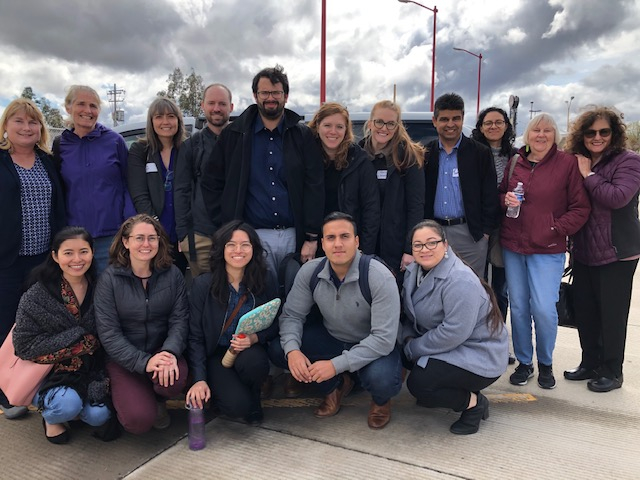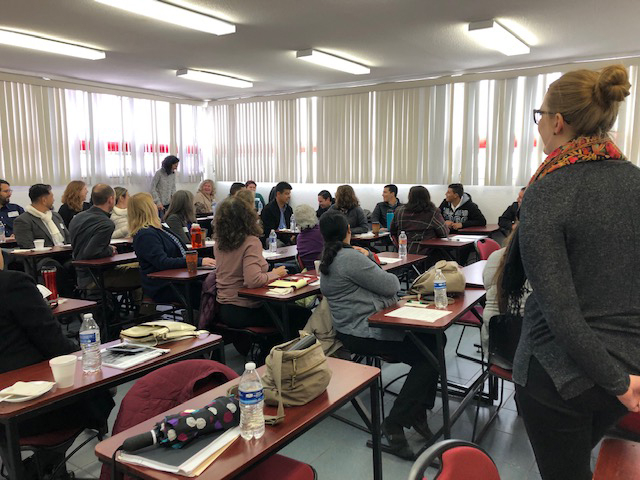Office of Community Engagement and Outreach
Border and Binational Collaborative Research
The College of Public Health is committed to engaging with partners to address the health challenges faced by those living, working and recreating along the U.S. - Mexico border communities and addressing ways to improve current conditions.
As a College of Public Health situated in the Southwest and one hour from the Arizona-Sonora border, we feel a special commitment to our border communities in both Arizona and Sonora. Our outreach encompasses building opportunities for our students, faculty and staff to engage in meaningful community engaged research, service and education throughout the region.
Binational Network for Healthy Communities in the Sonora-Arizona Border Region
Beginning in 2014 the College of Public Health has coordinated a binational Sonora-Arizona network of researchers, providers, educators, and activists to provide information regarding ongoing research, outreach and education to improve the quality of life in the border region. The network meets twice a year and provides an opportunity to present on going work and seek collaborators for new and future projects/programs/research. Our next meeting will be held on Tuesday February 11th from 11 to 1. For more information contact Jill Guernsey de Zapien dezapien@email.arizona.edu.
Meeting agenda for February 11, 2020
Border Health Information for Action
The College of Public Health in collaboration with SEAHEC coordinated a Sonora-Arizona event to bring together community organizations, health providers, health researchers, students and activists who are working to improve the health and wellbeing of our border communities. With funding from 12 different organizations, this two day forum (May 16 and 17, 2019) included over 170 individuals and organizations with presentations in six different tracks: Human Rights and Mental Health, Health Systems and Infectious Disease, chronic disease, maternal and child health, underserved populations, environmental and occupational health, Binational Collaboration, Partnering for Participatory Research and Action, and Migration and Health. For more information contact Jill Guernsey de Zapien dezapien@email.arizona.edu.
Binational Sonora-Arizona Farmworker Work Group
As part of the Binational Network, the Binational Sonora-Arizona Farmworker Workgroup has formed to promote health and wellness of border region agricultural workers and their families through advocacy, research and action The group consists of researchers and NGOS who are focused on improving the quality of life of farmworkers and their communities. The first meeting was held on November 8th in Nogales. The group is developing a repository of information documenting the health and living and working conditions of farmworkers in the region as well as policy documents and issues affecting farmworkers. The group will meet again in March.
Policy Recommendations for farmworkers in times of COVID: With collaboration from Arizona Prevention Center, SEAHEC, NAU Center for Health Equity, AZPHA, Arizona Rural Health Association, Nogales Binational Health Council and the Arizona-Sonora Binational Farmworker Work Group, we have developed a series of policy recommendations to serve as a guide for county health departments, growers, employers, contractors, farmworker groups and health care providers to utilize in the implementation of prevention measures with farmworkers.
COVID POLICY STATEMENT: English download | Spanish Download
For more information contact Jill Guernsey de Zapien dezapien@email.arizona.edu.
Meeting agenda from November 8, 2019
PBS video: ‘In this for the long haul’: How a labor organizer’s daughter became a force for rural health care
Cronkite News video: How building a community of care can improve farmworkers’ health
Service Learning in the Border Region
Service-Learning is a teaching and learning strategy that integrates meaningful community service with instruction and reflection to enrich the learning experience, teach civic responsibility, and strengthen communities. These community-engaged courses integrate meaningful reciprocal learning and reflective practice to develop the skills needed for effective work with communities and for social change.
-
Border Health Service Learning Institute is a week long one credit graduate level course which takes place in our border communities. Students, faculty, and community partners work together implementing a variety of activities aimed at strengthening the quality of life in our border region. Together we examine the relationship between migration, health, and economic development with an overarching theme of the role of public health professionals. For more information visit our Rural Health Professions Program Service Learning Courses page and check out the 2019 program page for Border Health Service-Learning Institute on our Center for Rural Health Website.
Fall 2020 Update: We have just completed our first Border Health Service Learning Institute via ZOOM during the fall semester. We had 16 amazing students with a focus on farmworkers and the Yuma/Somerton/San Luis/San Luis Rio Colorado during the time of COVID. The faculty included Kate Ellingson, Abby Lohr, Mario Trejo, Robert Guerrero and Jill Guernsey de Zapien. Four teams of students had the opportunity to interview and work with a community partner and identify areas of service that the course can support. We discussed comprehensive presentations on the root causes of migration and the history of immigration policies by Gail Emrick from SEAHEC and Bryna Koch, a DrPH doctoral student. Our community partners included: Yuma County Health Department, Campesinos sin Fronteras, Regional Center for Border Health, Centro Independiente de Trabajadores Agricola, and the Sonora-Arizona Binational Epidemiology team. We learned about the strategies and challenges that each organization is facing and the many creative responses in the community. The students identified four areas with materials that will be provided to all of the community partners. Housing, transportation, quarantine, and community prevention. It was indeed a new experience for all implementing service learning via ZOOM!
- Tucson Family and Child Health is a week long one credit graduate level course for MPH and doctoral students which takes place in our own community and the border region of Nogales, Arizona. Students, faculty, and community partners examine the fabric of the health and human services infrastructure serving our underserved populations and the policies that strengthen or challenge the quality of life in our community. For more information visit the Center for Rural Health web site.
-
MILAGRO (Migration Interprofessional Leading to Action and Growth) This course provides students from medicine, nursing, pharmacy, public health and social work with the opportunity to participate in a collaborative response to address migrant humanitarian needs in Southern Arizona. This 11 week one credit graduate level course includes training students to collaborate as part of an integrated team where they have the skills to work together, not just alongside others. It also includes training students to look at community or population health issues in a holistic fashion. Interprofessional practice provides a framework for a more comprehensive examination of community issues and community solutions. Learning Objectives include: 1. Analyze the root causes of migration including the role of political and economic policies in Latin America and U.S. immigration policies. 2. Apply transcultural practice skills to role of the volunteer in government and humanitarian organizations in meeting the immediate needs of migrants in our community. 3. Practice interprofessional collaboration in developing solutions to promote community health. 4. Use systems thinking to describe and analyze how health is created and maintained by all of the services provided at the shelter.
Fall 2020 Update: We have now completed our fourth cohort of interprofessional students who have participated in our Migrant Interprofessional Leadership for Action and Growth course. Twelve students participated in the course including students from public health, medicine, nursing and pharmacy at AHSC, ASU School of Social Work and University of Sonora Nursing Program. Our community partners included Casa Alitas, SEAHEC, and the Migrant Shelter in Hermosillo Service projects included the identification of books and development of materials on migration journeys for children and resource identification for Casa Alitas guests who are staying longer term in the community.
For more information contact Jill Guernsey de Zapien dezapien@email.arizona.edu
LUCHA
LUCHA (Learning, Understanding, and Cultivating Health Advocacy) is a group collective in the UA Mel and Enid Zuckerman College of Public Health, which promotes health advocacy through policy education, service, and campus engagement amongst Arizona-local community and institutional settings. L.U.C.H.A. is composed of students, alumni, faculty, staff, and community members, students, who are interested in supporting the L.U.C.H.A. mission."LUCHA connects students to community service opportunities in order to cultivate awareness for border health and human rights issues in the U.S.-Mexico border region. More information is available on their Facebook page.
Immigration Dragnet and the Dispossession of Wealth in the US.pdf
Leaders Across Borders
An advanced workforce development program aiming to develop leadership skills in public health professionals in the US-Mexico Border Region. Leaders Across Borders was funded in 2010 by the United Sates-Mexico Border Health Commission (USMBHC). The curriculum was develop by the Mel and Enid Zuckerman COPH and the Mexican Section of the USMBHC.
- The Leaders across Borders Certification Program—A Systemic Multiple Level Observation of Groups Analysis Approach to Measure Effective Leadership: A Case Study
- Impacting Binational Health through Leadership Development: A Program Evaluation of the Leader across Borders Program, 2010-2014
- Student Evaluation of the Leaders across Borders Program (PPT)
- Student Poster for the Evaluation of Leaders across Borders (PPT)



